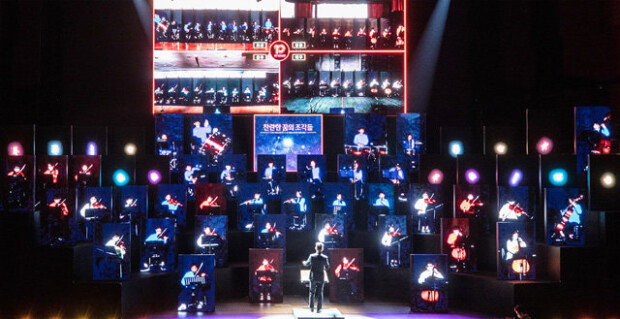55 performers showing up on LED panels for orchestra live stream
55 performers showing up on LED panels for orchestra live stream
Posted November. 19, 2020 07:55,
Updated November. 19, 2020 07:55

The familiar notes of “Arirang Fantasy” filled the Concert Hall of the Seoul Arts Center located in Seocho-gu, Seoul on Tuesday. One by one, the members of the orchestra appeared on the 55 LED panels arranged in orchestra seating order. Only conductor Kwon Jeong-hwan stood on the stage, while the recording of orchestra members was played. Despite the recording, it was like a live performance.
The performance “I CONTACT, held to celebrate the 10th anniversary of the Orchestra of Dreams, was broadcasted on YouTube due to COVID-19. Around 200 of the orchestra members attended the event. Orchestra of Dreams, known as the Korean version of the Venezulean El Sistema program, a music education program for the young in impoverished areas. The wistful notes of Rachmaninoff’s Vocalise was performed with singer Henry who played the violin and orchestra member Kim Narae.
Members of the orchestra in Osan, Gangneung, Pyeongchang, Gongju, Daegu were broadcasted live when they performed “The Shining Pieces of Dreams,” the five pieces most frequently played by the orchestra over the last decade, which includes Dvorak’s New World Symphony Fourth Movement and Elgar’s Pomp & Circumstance March. The music played by the children who had not even known the name of the musical instruments was clear and beautiful in harmony.
The Orchestra of Dreams, run by the Ministry of Culture, Sports and Tourism, the Korea Arts and Culture Education Service, and local governments, initially started out in 2010 with 470 members across eight institutions, which has grown to around 2,800 at 49 institutions across the nation. Accumulated membership stands at around 19,700, with 4,000 instructors involved. The Ministry and the Korea Arts and Culture Education Service sponsor the costs for three years and local governments foot half of the bills for three years. After six years, the cost is entirely funded by local governments.
Children who had not been familiar with lesser known musical instruments such as the clarinet, oboe, timpani and double bass, have not only learned how to play them but also the value of playing and staying together. Kim Narae first took cello lessons in the Orchestra of Dreams in Tongyeong when she was in fifth grade. “I feel happy and content when I listen to the cello,” says Kim. Despite financial worries, Kim has decided to pursue a musical degree in cello, and an instructor at the orchestra gave her lessons. She was accepted to the Gifted Program at the Korea National University of Arts in the second year of middle school, travelling nine hours back and forth on the bus from Tongyeong to Seoul. As sophomore, she is attending Kyong Buk Art High School.
“I was so shy that I couldn’t even order delivery food, but I became more outgoing as I played in the orchestra. I want to become a performer that can console others with my music,” she said. “I want to teach children like me who come from less fortunate families. I want to give back what I’ve been given.”
Children’s personalities changed as they learned music with other friends. A student with the Orchestra of Dreams in Gochang earned confidence as he learned how to play the double bass. His negativity changed and he started looking after other younger children when he became a sixth grader. “I was sad when I read his journal full of negative feelings, but since joining the orchestra he became more expressive, commenting about his struggles to play better, motivations and fun moments, “ said his mother. A student who had hidden his face under his hair because he didn’t want others to look at him came out of his shell as he played the cello and became a part leader. “I want to experience more and pursue my dreams,” he said.
“At first I felt afraid when I led the orchestra because the children appeared like blank slates, but as they chose and played instruments uniquely befitting to their individual traits, I became encouraged from their vast potential,” said Yoon Yong-woon, music director who has been leading the orchestra at the Seongdong branch in Seoul since 2012.
“Music is powerful,” says those who communicate through music and learn from each other.
Hyo-Lim Son aryssong@donga.com






